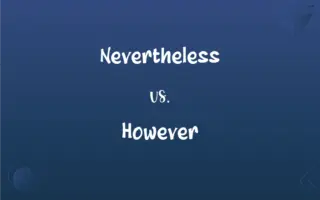Unconscious vs. Subconscious: What's the Difference?
Edited by Aimie Carlson || By Harlon Moss || Published on January 22, 2024
Unconscious refers to a state of lack of awareness or responsiveness, while subconscious pertains to mental processes occurring without conscious awareness.

Key Differences
The unconscious is a state where one is not aware of their surroundings, often due to injury, illness, or sleep. The subconscious, however, refers to the part of the mind that operates without one's conscious perception, influencing thoughts and behaviors.
Unconsciousness can be a temporary condition, like fainting or deep sleep, where external stimuli don’t elicit a response. In contrast, the subconscious mind continuously influences our decisions and feelings without our direct awareness.
Medical conditions, such as coma, can result in a person being unconscious. The subconscious mind, however, is always active, storing memories and experiences that subtly affect conscious actions.
The unconscious state is often assessed in medical fields to understand a patient’s responsiveness. The subconscious plays a crucial role in psychological theories, particularly in understanding personality and motivation.
An unconscious person cannot perform voluntary actions and is unaware of their environment. The subconscious mind, while not directly accessible, can be explored through methods like psychoanalysis to reveal hidden desires and fears.
ADVERTISEMENT
Comparison Chart
Definition
State of not being awake or aware
Part of the mind not in conscious thought
Example Condition
Coma, deep sleep, anesthesia
Hidden memories, instincts, desires
Responsiveness
Unable to respond to external stimuli
Influences responses without awareness
Role in Psychology
Assessed for medical or mental health
Analyzed for underlying motives, thoughts
Accessibility
Not accessible during the state
Accessible indirectly through therapy
ADVERTISEMENT
Unconscious and Subconscious Definitions
Unconscious
In a state where normal sensory perception is suspended.
During surgery, patients are often rendered unconscious.
Subconscious
Pertaining to thoughts and feelings existing in the mind but not immediately available to consciousness.
Our subconscious fears can influence our daily decisions.
Unconscious
Not awake and not aware of and responding to one's environment.
He was unconscious for several minutes after the accident.
Subconscious
A part of the mind's function that occurs below the level of conscious awareness.
Dreams are often expressions of our subconscious mind.
Unconscious
In psychology, pertaining to processes not consciously perceived.
Traumatic experiences can reside in the unconscious mind.
Subconscious
Influencing thought and behavior without full conscious awareness.
His dislike for the color was a subconscious preference.
Unconscious
Temporarily devoid of consciousness.
The boxer was knocked unconscious in the final round.
Subconscious
The part of the mind not fully aware but influencing actions and feelings.
Subconscious biases can affect our judgments and interactions.
Unconscious
Lacking awareness and conscious control.
She fell unconscious due to severe dehydration.
Subconscious
An underlying layer of consciousness, active but not overtly recognized.
Artists often tap into their subconscious to create.
Unconscious
Lacking awareness and the capacity for sensory perception; not conscious.
Subconscious
Not wholly conscious; partially or imperfectly conscious
Subconscious perceptions.
Unconscious
Temporarily lacking consciousness.
Subconscious
The part of the mind below the level of conscious perception. Often used with the.
Subconscious
Partially conscious.
Subconscious
Syn of unconscious.
The sense of smell can be a subconscious influence on our actions.
Subconscious
Syn of unconscious.
A person can sometimes wake up knowing the solution to a problem that their subconscious has been working on.
Subconscious
Occurring without the possibility or the fact of an attendant consciousness; - said of states of the soul.
Subconscious
Partially conscious; feebly conscious.
Subconscious
Psychic activity just below the level of awareness
Subconscious
Just below the level of consciousness
FAQs
Is being unconscious always a medical concern?
Often, but not always; it depends on the cause and duration.
Can subconscious thoughts become conscious?
Yes, through reflection, therapy, or spontaneous realization.
Can someone be both unconscious and subconscious?
Yes, one can be unconscious physically while the subconscious mind remains active.
What role does the subconscious play in behavior?
It subtly influences decisions, feelings, and actions.
What does unconscious mean?
It refers to a state of not being aware or responsive.
What does subconscious mean?
It involves mental activities beneath conscious awareness.
Is dreaming considered unconscious or subconscious?
Dreaming occurs during unconscious states but is influenced by the subconscious.
How do unconscious and subconscious differ in psychology?
Unconscious refers to a state of mind, while subconscious refers to underlying processes influencing behavior.
What causes unconsciousness?
Factors like injury, illness, anesthesia, or sleep.
How long does unconsciousness last?
It varies, from seconds to prolonged periods in cases like coma.
Is the subconscious always active?
Yes, it operates continuously, even when we're not aware.
How does one access subconscious thoughts?
Through methods like psychoanalysis, meditation, or dream analysis.
Are all unconscious states the same?
No, they vary in depth and cause, from fainting to deep comas.
Do subconscious thoughts affect mental health?
Yes, they can significantly impact one's emotional and psychological well-being.
Is being unconscious the same as sleeping?
No, sleep is a natural state, while unconsciousness can indicate a medical issue.
Can subconscious feelings be negative?
Yes, they can include fears, biases, or negative experiences.
How does the subconscious impact learning?
It can influence how we process and retain information subliminally.
Can unconsciousness be self-induced?
Typically not; it's usually due to external factors.
Can one control their unconscious state?
Generally, no, as it's a state beyond conscious control.
How are subconscious thoughts formed?
From past experiences, memories, and deep-seated emotions and beliefs.
About Author
Written by
Harlon MossHarlon is a seasoned quality moderator and accomplished content writer for Difference Wiki. An alumnus of the prestigious University of California, he earned his degree in Computer Science. Leveraging his academic background, Harlon brings a meticulous and informed perspective to his work, ensuring content accuracy and excellence.
Edited by
Aimie CarlsonAimie Carlson, holding a master's degree in English literature, is a fervent English language enthusiast. She lends her writing talents to Difference Wiki, a prominent website that specializes in comparisons, offering readers insightful analyses that both captivate and inform.






































































